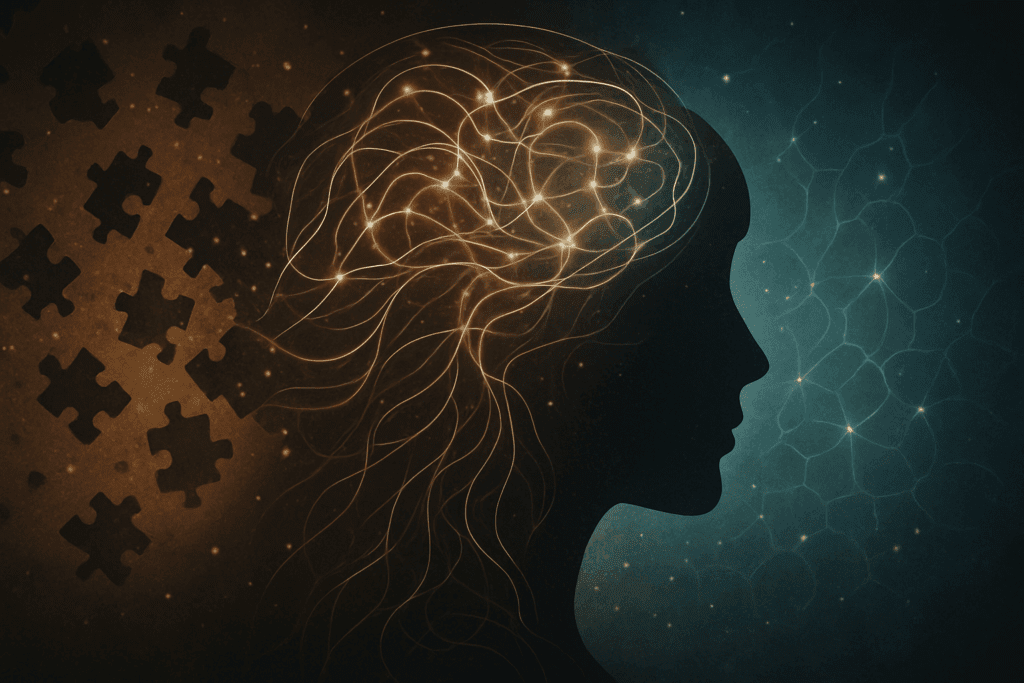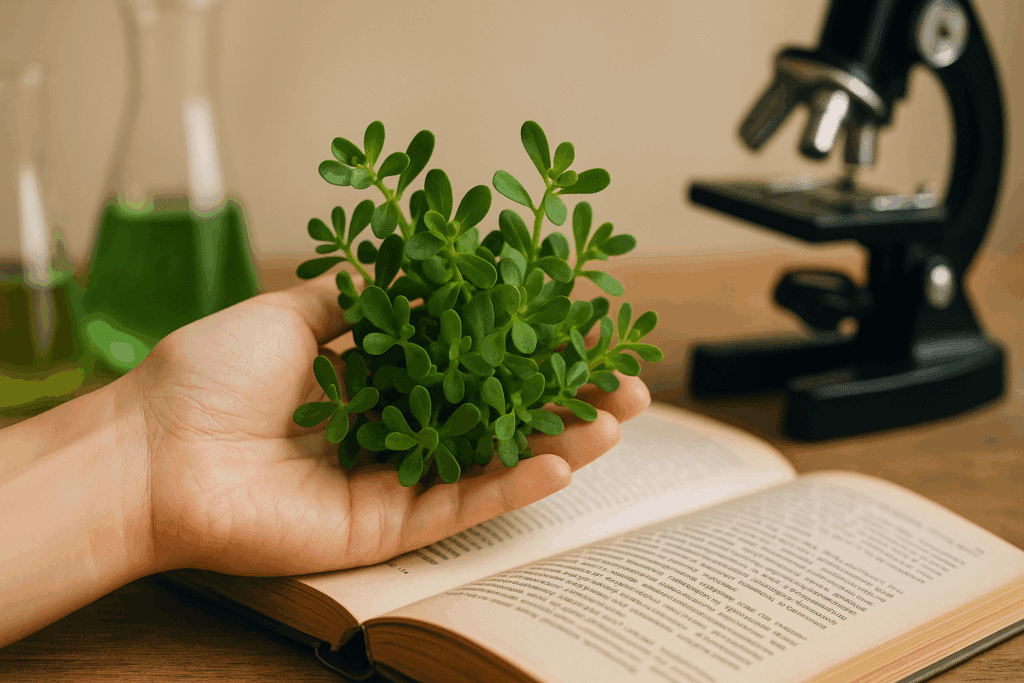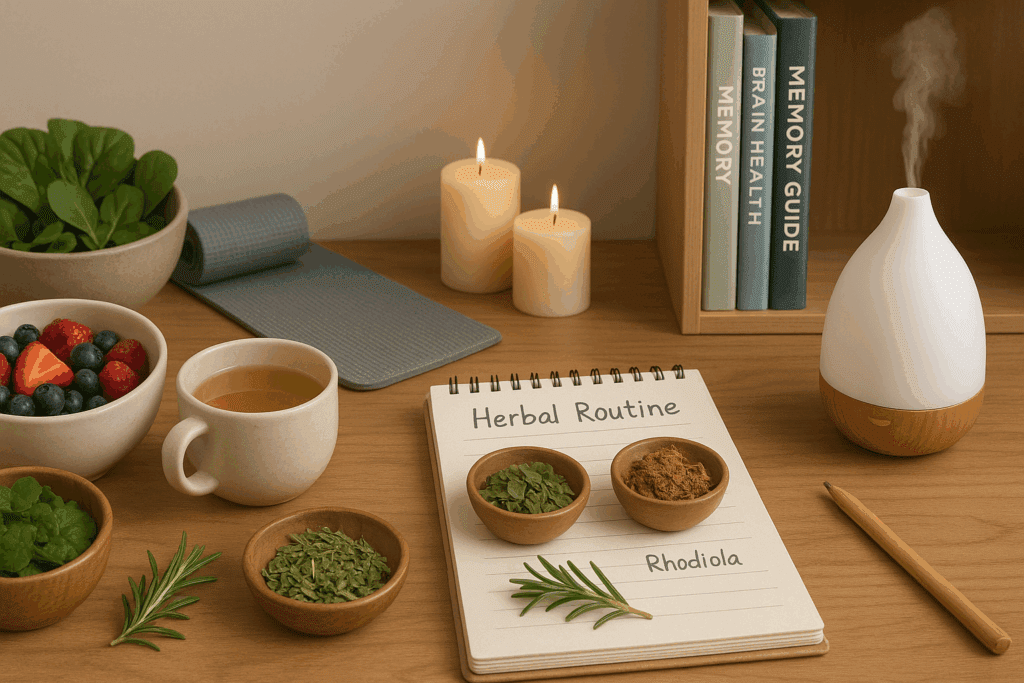Attention-Deficit/Hyperactivity Disorder (ADHD) affects millions of people worldwide, with a growing awareness that it manifests differently in women than in men. While prescription medications like stimulants are commonly used, many women seek natural alternatives that can support cognitive clarity, emotional regulation, and memory retention. Science has increasingly turned its gaze toward botanical therapies, exploring how natural herbs may assist in sharpening focus, soothing the nervous system, and improving memory performance—particularly for those navigating the unique neurological landscape of female ADHD.
You may also like: Best Herb for ADHD Support: How Natural Remedies and Herbs for ADHD Women May Help Boost Focus and Calm
Herbs have been part of traditional medicine systems for centuries, but recent research underscores their potential as evidence-based supplements for cognitive enhancement. This article takes a deep dive into top science-backed herbs for ADHD in women, their mechanisms of action, safety profiles, and how to choose the best one for your individual needs. Along the way, we’ll explore tips for memory enhancement, including methods of memorization, how to memorize a paragraph fast, and practical strategies for how to remember things fast during high-pressure study sessions or exams.
Understanding ADHD in Women: Unique Challenges and Cognitive Needs
ADHD in women is often underdiagnosed or misdiagnosed due to its more subtle and internalized presentation. Instead of hyperactivity, many women experience inattentiveness, emotional sensitivity, and executive function challenges that impact everyday responsibilities. These symptoms can interfere with academic performance, career advancement, and emotional well-being. As a result, many women search for sustainable, natural methods to support attention and mental clarity.
One of the key hurdles women with ADHD face is difficulty with memory and organization. Knowing how to memorize quickly or how to learn text efficiently becomes more than a productivity skill—it becomes a vital tool for managing everyday life. This is where targeted herbal supplements, when combined with effective memorization tips for studying, can form a powerful integrative approach.

Bacopa Monnieri: The Ayurvedic Ally for Memory and Attention
Bacopa monnieri has long been used in Ayurvedic medicine as a “medhya rasayana,” or brain tonic, prized for enhancing learning and memory. Modern research supports this ancient wisdom, showing Bacopa’s ability to improve cognitive function, particularly working memory and attention span. Active compounds called bacosides are thought to enhance nerve impulse transmission, reduce anxiety, and even protect the brain from oxidative stress.
Clinical trials have shown that Bacopa can improve delayed recall and spatial working memory, making it one of the best herbs for ADHD in women who struggle with information retention. For students or professionals wondering how to memorize something quickly or how to memorize a paragraph for a test, Bacopa can be a valuable supplement when used consistently over time.
Additionally, Bacopa’s adaptogenic effects help regulate cortisol levels and reduce the mental fatigue often associated with ADHD. Its dual impact on focus and calmness makes it particularly effective for managing emotional dysregulation and improving memory methods for studying under stress.
Ginkgo Biloba: Enhancing Circulation and Neural Efficiency
Ginkgo biloba is another powerhouse herb with well-documented cognitive benefits. It enhances cerebral blood flow, delivering oxygen and nutrients more effectively to the brain. For women with ADHD, this increased circulation can lead to sharper focus, faster information processing, and better recall.
Ginkgo has been studied extensively for its effects on memory and mental performance. Its flavonoids and terpenoids exhibit antioxidant and anti-inflammatory properties, which may protect brain cells from damage. Those seeking how to remember information for a test or how to memorize things quickly often turn to Ginkgo as part of their daily nootropic regimen.
One of Ginkgo’s unique strengths lies in its impact on executive functions, which are often impaired in ADHD. By supporting prefrontal cortex activity, it enhances decision-making, time management, and emotional self-regulation—all crucial for academic and professional success.

Rhodiola Rosea: A Natural Adaptogen for Mental Clarity
Rhodiola rosea is a flowering herb from Siberia known for its adaptogenic properties—its ability to help the body resist physical and mental stress. For women with ADHD, Rhodiola can offer a much-needed buffer against the overwhelm that often accompanies task-switching, information overload, and emotional lability.
In clinical settings, Rhodiola has shown promise in improving attention, reducing fatigue, and boosting overall cognitive performance. It is particularly useful for those who need to learn how to memorize things fast for exam situations or who require fast-acting cognitive support without the jitters of caffeine or stimulants.
Rhodiola’s mechanism involves the regulation of neurotransmitters like serotonin and dopamine, both of which play key roles in attention and mood. By stabilizing these systems, Rhodiola enhances both focus and emotional balance, which is essential for memory methods for studying and retaining material effectively.
Gotu Kola: The Traditional Remedy for Calm Focus
Gotu kola (Centella asiatica) is another herb with deep roots in traditional medicine, especially within Ayurveda and Traditional Chinese Medicine. Often described as a rejuvenating tonic for the mind, Gotu kola has been used to support cognition, reduce anxiety, and promote mental clarity.
What sets Gotu kola apart is its calming yet clarifying effect. For women with ADHD, this can translate to improved focus without overstimulation. Its triterpenoids are believed to enhance circulation and promote neuronal growth, helping you remember what you read for exams or how to memorize something for a test with greater ease.
Recent research has begun to validate Gotu kola’s traditional uses, demonstrating its potential for improving working memory and attention span. For individuals seeking tips to memorise long texts or understand how to learn text fast, this herb may be a gentle yet powerful addition to a natural cognitive support regimen.

Lion’s Mane Mushroom: Neurogenesis and Cognitive Longevity
Lion’s Mane (Hericium erinaceus) is a medicinal mushroom gaining popularity for its neuroregenerative effects. Unique among herbs and fungi, Lion’s Mane stimulates the production of Nerve Growth Factor (NGF), which supports the repair and regeneration of neurons. This makes it particularly beneficial for women managing ADHD-related brain fog or memory lapses.
Unlike other herbs that focus on immediate enhancement, Lion’s Mane works gradually over time to improve neuroplasticity and long-term memory retention. It is especially helpful for those looking to develop sustainable study skills memorization techniques or for those who want to know how to memorize something overnight without relying on synthetic aids.
Lion’s Mane also supports a calm but alert state of mind, which is ideal for women juggling multiple roles and responsibilities. As part of a daily nootropic routine, it enhances clarity and resilience, two qualities that are essential for effective learning and memory formation.
Choosing the Right Herb for Your ADHD Profile
Selecting the best herb for ADHD isn’t a one-size-fits-all decision. Women experience ADHD in highly individualized ways, and choosing the right herbal remedy involves understanding your specific cognitive challenges and goals. For instance, if emotional overwhelm is your primary concern, Rhodiola or Gotu kola may be more suitable. If you’re struggling with how to memorize things fast for exams or looking for memory methods for studying, Bacopa or Ginkgo might be more effective.
Start by identifying the key issues you wish to address—whether it’s impulsivity, distractibility, fatigue, or memory lapses. Then consult with a healthcare provider familiar with integrative medicine to ensure that your chosen herb doesn’t interact with other medications or health conditions.
Consistency is crucial. Herbs work best when used regularly over time, rather than as quick fixes. They can be powerful allies in helping you learn how to memorize quickly and develop lasting memory methods and techniques that improve not just test performance, but overall cognitive health.

Supporting Herbs with Lifestyle Practices for Optimal Results
While herbs can significantly improve attention and memory, they work best when paired with supportive lifestyle practices. Nutrition plays a pivotal role in cognitive health, and diets rich in omega-3 fatty acids, leafy greens, and antioxidant-rich berries can amplify the effects of herbs. Physical activity also enhances neuroplasticity and supports memory consolidation.
Equally important are sleep hygiene and stress management. Getting adequate rest is essential when you’re trying to memorize a paragraph fast or remember what you read for exams. Sleep is when memory consolidation occurs, and chronic deprivation can sabotage even the best study techniques for memorization.
Practicing mindfulness or engaging in breathing exercises can also help reduce the mental clutter often associated with ADHD. These techniques pair well with herbs like Gotu kola and Rhodiola, which further calm the nervous system. Together, they create an internal environment where memory methods for studying can thrive.
Herbal Combinations: Synergistic Strategies for Maximum Cognitive Support
Some of the most effective natural protocols involve combining herbs to leverage their synergistic effects. For instance, pairing Bacopa with Lion’s Mane can simultaneously support short-term recall and long-term brain health. Similarly, Ginkgo and Gotu kola may work together to enhance circulation and calm the mind, creating ideal conditions for those seeking how to memorize something in 10 minutes or how to memorize something overnight.
When combining herbs, it’s important to monitor how you feel and adjust dosages accordingly. Herbal synergy can be powerful, but each person’s biochemistry is unique. Keep a journal of your experiences to track improvements in focus, retention, and emotional balance.
These combinations also open the door to integrating memorization tricks for studying, like the loci method or spaced repetition. With a stronger cognitive foundation, you’re better equipped to master how to memorize things fast for a test, and to employ memory methods for studying that match your learning style.

Frequently Asked Questions (FAQ): Top Science-Backed Herbs for ADHD in Women
What are some lesser-known factors that can influence how well herbs work for ADHD in women?
While the effectiveness of herbs like Bacopa or Ginkgo is often discussed in terms of dosage and quality, individual biochemistry plays an equally critical role. Factors such as hormone fluctuations during the menstrual cycle, gut health, and micronutrient deficiencies can significantly influence how these herbs are metabolized. For example, estrogen dominance may affect dopamine pathways, altering how certain herbs modulate attention and mood. Understanding these subtleties is especially helpful for women trying to learn how to memorize a paragraph quickly while managing hormonal changes. A personalized approach, possibly involving functional lab testing, can make a profound difference in how to learn text and retain it more efficiently.
Can herbal strategies help reduce procrastination in women with ADHD?
Yes, certain herbs support neurotransmitter balance and executive function, which are key in managing procrastination. Rhodiola rosea, for instance, can reduce mental fatigue and elevate motivation, making it easier to start and complete tasks. This is particularly useful for students or professionals who need to figure out how to memorize a paragraph fast under time pressure. When combined with time-blocking methods or Pomodoro-style study sessions, the right herb can improve initiation and completion rates. If you’re exploring how to learn text for an exam, these plant-based tools can help kick-start the cognitive momentum you need.
How can you combine herbal support with technology to enhance learning outcomes?
Integrating herbal supplementation with digital learning platforms creates a dynamic environment for improved focus and memory. Apps like Anki or Notion paired with Bacopa or Lion’s Mane can reinforce memory consolidation through spaced repetition and visual learning. For those wondering how to memorize a paragraph quickly, these platforms can break down material into manageable segments, allowing for active recall and deeper engagement. The combination of technology and adaptogens can be especially effective for women who need to juggle multitasking while mastering how to learn text or how to memorize things quickly for work or school.
Are there lifestyle practices that amplify the effects of herbs for memory and focus?
Absolutely. Movement-based activities like dance or yoga can improve neuroplasticity, making the brain more responsive to herbal therapies. Nutritional strategies that support neurotransmitter production—such as consuming tyrosine-rich foods—can work synergistically with herbs like Ginkgo. Additionally, using olfactory anchors (like essential oils) while studying and then revisiting those scents during exams can enhance recall. These practices offer a somatic layer of reinforcement that complements traditional study skills. When paired with herbal support, they make it easier to figure out how to memorize something quickly and retain it long-term.
How can women with ADHD use herbs to enhance creativity as well as focus?
Creativity often fluctuates with mood and cognitive bandwidth. Herbs like Gotu kola not only support focus but also help open up divergent thinking by reducing anxiety and promoting calm clarity. This balance is vital when you’re trying to think outside the box or learn how to memorize a paragraph fast for a presentation that requires improvisation. Enhanced alpha brain wave activity—encouraged by certain herbs—can lead to greater mental flexibility and novel idea generation. For creative professionals who also need to know how to learn text quickly, this can be a breakthrough combination.
What is the best way to track the effectiveness of herbs for ADHD?
Keeping a structured cognitive journal can help you understand how each herb affects different facets of attention, memory, and mood. Track not just the herb and dosage, but also contextual factors such as sleep quality, diet, and emotional stress levels. You might discover that you memorize a paragraph quickly only on certain days, revealing patterns you can optimize. Include specific markers like how long it takes to learn a new text or how many repetitions are required to retain information. Over time, this data will offer insights into how to learn text more efficiently and sustainably.
Can herbs make a difference in how well women perform under pressure, such as in timed tests?
Yes, herbs like Rhodiola and Lion’s Mane can increase stress resilience and improve cognitive endurance, especially during high-stakes exams or presentations. By modulating cortisol and supporting neural connectivity, these herbs can reduce performance anxiety and mental fog. This can significantly impact how to memorize things quickly and retrieve that information under pressure. Women who practice timed recall exercises while using these herbs may find they can memorize a paragraph fast and reproduce it more fluently. The mental edge they provide can turn a nerve-wracking exam into a demonstration of prepared confidence.
How do different forms of herbal supplements—capsules, tinctures, teas—affect their performance for ADHD-related focus?
The form in which you take an herb can influence both its onset and duration of action. Tinctures generally absorb faster and are ideal for immediate support, such as right before studying or a test. Teas offer a gentler, more ritualistic approach that works well for ongoing maintenance and stress relief. Capsules provide the most consistent dosing and are convenient for long-term use. Choosing the right format can be essential when strategizing how to memorize a paragraph quickly before a meeting or how to learn text fast during revision periods. Experimenting with different formats can help optimize both absorption and adherence.
What are some science-backed methods to enhance herbal effectiveness in ADHD treatment?
Bioavailability enhancers like black pepper extract (piperine) or liposomal delivery systems can significantly increase the absorption of certain herbs, making them more potent. Timing your intake around meals or sleep can also affect how well the active compounds are utilized by the brain. Cognitive priming—reading or previewing material just before taking an herb—can accelerate the mental impact. Combining this with mindfulness techniques or breathwork may amplify results, especially if you’re trying to figure out how to memorize something quickly. These advanced strategies move beyond traditional supplementation into more sophisticated realms of biohacking.
How does the role of social support interact with herbal strategies for ADHD and memory?
Social reinforcement can dramatically enhance learning outcomes, particularly when paired with herbal interventions. Studying with a peer group while using focus-enhancing herbs like Bacopa can increase accountability and reduce distractions. Group learning also enables collaborative memory techniques, like teaching others or engaging in verbal recall games. These experiences not only strengthen memory but also build confidence—essential when you’re trying to learn how to memorize a paragraph fast in a high-pressure academic or work setting. The synergy between community, cognition, and supplementation offers a holistic route to better performance and emotional well-being.

Conclusion: Empowering Women with ADHD Through Nature and Neuroscience
Navigating ADHD as a woman presents unique cognitive and emotional challenges, but it also offers the opportunity to engage with holistic, empowering strategies. Science-backed herbs like Bacopa, Ginkgo, Rhodiola, Gotu kola, and Lion’s Mane provide a promising toolkit for enhancing attention, memory, and emotional regulation. When combined with personalized memory techniques, these herbs become more than supplements—they become daily rituals of support and self-care.
Learning how to memorize quickly, how to memorize things fast for exams, or how to remember information under pressure doesn’t have to be stressful. With the right combination of herbs and techniques, women can cultivate sharper focus, improved memory, and a deeper sense of cognitive clarity. In the end, choosing the best herb for ADHD is not just about managing symptoms—it’s about reclaiming agency over your mental landscape and thriving in every area of life.
Further Reading:
How to memorise an absurd amount of text.
Quick Ways to Memorize Long Texts and Paragraphs
How to Memorise Long Text in the Shortest Amount of Time Possible


